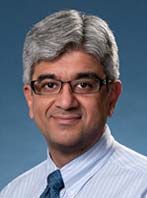A Collective Vision of Arthritis Research

Nizar Mohamed
|
UHN Orthopaedic Division
Head Nizar Mohamed and his
colleagues have put together
a vision that brings them
together in a cohesive research
and fundraising effort. These
Orthopaedic surgeons at
Toronto Western Hospital came
to a critical decision in 2010.
They resolved to offer arthritis
patients more than pain management
and joint replacement. Their vision is to create
a world-leading centre for research and treatment of
arthritis: “Arthritis research lags behind other diseases,
yet it affects an immense number of people worldwide
and has a staggering effect on their quality of life and
productivity. Our goal is to find a way to diagnose arthritis
early, develop novel treatments that halt the progress
of arthritis, and create personalized treatment plans to
prevent the onset of the disease.”
In collaboration with the Toronto General and Western
Hospital Foundation, they launched the Campaign
to Cure Arthritis. The $35M campaign will fund the
research and needed infrastructure. To show their commitment
to their cause, the surgeons decided to put their
own skin in the game by making a ground breaking
personal gift – a collective $1.25M. The surgeons’ commitment
has, in two short years, inspired hundreds of
their grateful patients to join in their quest to make joint
replacements obsolete. At this time, $31.3M has been
raised toward the $35M goal. “This shows the power of
a collective vision and the power of investing your own
funds in research - a very persuasive factor”.
The surgeons created a strategic business plan that
has now been validated by an international Academic
Advisory Board (AAB). The programme is a multidisciplinary
academic/business hybrid that involves
strong collaborations with key researchers both within
and outside of UHN. Significant funding from private
donors has enabled more rapid implementation of
research studies than traditional resources such as
government and NGO funding. The establishment of the
AAB, comprising surgeons and researchers with international
stature, was a key initiative. The members are:
Robin Poole, Professor Emeritus at McGill University;
Stefan Lohmander, Professor in the Department of
Orthopedics at Lund University in Sweden and Editorin-
Chief of the journal Osteoarthritis and Cartilage;
Eng Lee, Professor of Orthopaedic Surgery and Program
Leader of the Tissue Engineering Program at National
University in Singapore; Frank Berry, Professor of
Cellular Therapy at the National University of Ireland
in Galway and Director of the University’s National
Centre for Biomedical Engineering Science ; and Jeff
Katz, Professor of Medicine and Orthopaedic Surgery at
Harvard Medical School and Professor of Epidemiology
and Environmental Health at Harvard School of Public
Health.
|
The AAB meets annually in person. At their first
meeting in 2012, they reviewed the proposed research
programme presented by the Divisional surgeons.
They supported three major priorities for research: 1.
Continue with the development of the informatics platform
spearheaded by Christian Veillette and focused on
clinical and health outcomes. This encompasses many
research studies, including the Longitudinal Evaluation
of Arthritis Patients. 2. Collection of tissue from various
parts of the joint during total joint replacement
surgery and investigation of the connection between
osteoarthritis and the metabolic syndrome, spearheaded
by Rajiv Gandhi. Rajiv is studying fat pad leptins and
adipo-leptin and their correlation with pain and disability,
as reported earlier in the Spotlight (see article). 3. The study of stem cells
for symptomatic relief and in other innovative applications.
Collaborations in this area include local UHN
research groups as well as a company in Korea. Clinical
trials are anticipated within 2 years.
The first Arthritis Industry Forum was held in May,
including representatives from informatics, imaging,
new technology, pharma, and medical device companies.
The Forum showcased research being conducted within
the Division and presentations by industry attendees
seeking areas of mutual interest and opportunities for
sustainability.
The Division continues to expand with the recent
addition of two surgeons, one with a specialty in sports
medicine and the other focusing on ankle and lower
extremity surgery. “Since the basic research component
of the programme is critical, we are currently conducting
searches for three scientists. One will work with
TECHNA on innovative imaging techniques; one will
be a cartilage biologist with an interest in the metabolic
syndrome and its relation to osteoarthritis, and the
third will focus on translational research on stem cells
in osteoarthritis.” The expansion of the surgical and
clinical aspects in tandem with the strengthening of basic
research positions the division well for achieving its goals
of early diagnosis and development of novel treatments
that halt the progress of arthritis.
MM and Nizar Mohamed
|